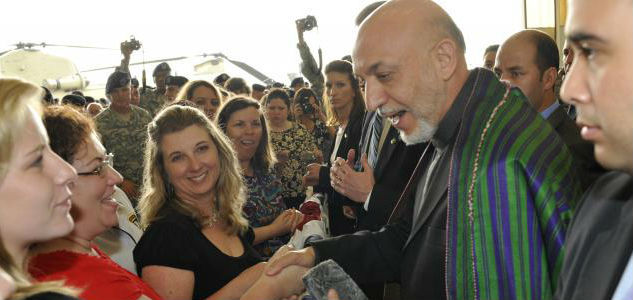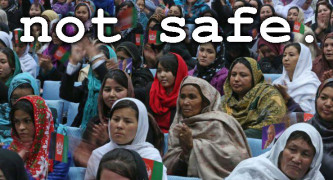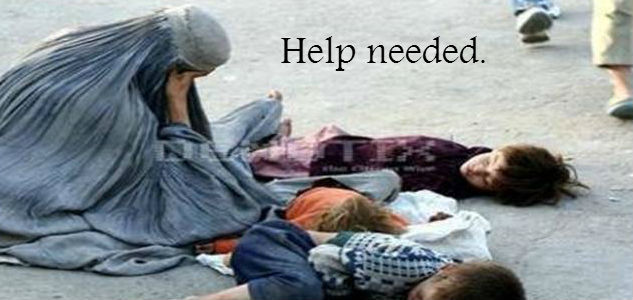
Hashoo Foundation (HF) is implementing a project for the Afghan Refugees residing in I-12 Islamabad who were deprived from the basic needs of life. Hashoo Foundation with the support of United Nations High Commission for Refugees (UNHCR) and Gesellshaft Technische Zusamenarbeit (GTZ) has been able to establish two basic health units for males and females, initiate primary education system for the children and equip young people with some marketable skills such as tailoring, embroidery, motor winding and electrician.
Afghan Refugee Population Back From Pakistan
by Anam Mughal
Spokesperson for the UNHCR, Aslam Khan, has confidently stated that media reports of forced Afghan refugee repatriation are baseless. Khan explained that UNHCR had looked into the matter and contacted government officials to question the credibility of these reports. She also made it clear Pakistan has no intention of going against their agreement, and is not aggressively ousting Afghan refugees from their camps.
It is no hidden fact that Pakistani officials had, in previous years, openly stressed the notion that they wanted the 3 million registered and non-registered Afghan refugees to move back to their homeland by December 31, 2012. Most of these refugees, who had lived their whole lives in Pakistan and had never seen their native homeland, were to go back to this war-torn country subjected to a history of foreign invasion.

Pakistan claims that nearly three decades ago, they had openly welcomed the refugees when no other country was willing to provide such altruism during the Soviet Union militant invasion of Afghanistan. The neighboring country provided these Afghani refugees with a sense of security, housing, and employment opportunities.
However, Pakistan has made it clear that they could not shoulder the responsibility of running this overdue refugee program of 30 years any longer. Pakistan has concerns about their debilitating economy and national security issues. Due to their refugee program, they have faced hurdles such as heightened drug trafficking, militancy and limited funding for such a large scale international program. The hosting country’s officials have exclaimed “enough is enough” as they were not receiving sufficient aid from the international community to continue refugee support.
Afghani refugees are anxious about talks of forced repatriation because they do not wish to go back to a country that is still plagued with air strikes, erratic Taliban attacks, and costly living with little to no job opportunities. For instance, Afghan refugee Rangeen has called Pakistan his home since he was 12 years old and is officially registered as a refugee.
He attempted to move back to Kabul, the capital of Afghanistan, three times but due to terse financial circumstances he moved back to Pakistan. He exclaims, “I couldn’t find work in Kabul, and it is very expensive there, so each time I was forced to come back…I’m just a laborer. It is not possible to survive in Kabul on what you make as a laborer there.” Furthermore, in the midst of all this, international security forces are drawing down their troop presence in a transition period that could possibly trigger a return to all-out civil war.
Refugee Population in Pakistan Analysis
As of now there are 1.7 million Afghan refugees registered in Pakistan—more than half of which are younger than 18. An additional 1 million are estimated to be unregistered and living illegally in Pakistan. The Afghan government is ill prepared in planning to deal with such an influx of displaced people returning to their country. They do wish for their people to be able to return, but only when the country’s economy and political atmosphere are more stable. Sudden and immense migration will only undermine the progress that is being made in Afghanistan by a US-led international coalition.
 However, this year UNHCR has actively worked to resolve this crisis when the UN High Commissioner for Refugees Antonio Guterres met with Prime Minister Yousuf Raza Gilani and Foreign Minister Hina Rabbani Khar on February 2nd, to discuss an agreement reached in Dubai just a few days prior between Pakistan, Iran, Afghanistan and UNHCR to implement a regional strategy focused on developing durable solutions to the Afghan refugee issue.
However, this year UNHCR has actively worked to resolve this crisis when the UN High Commissioner for Refugees Antonio Guterres met with Prime Minister Yousuf Raza Gilani and Foreign Minister Hina Rabbani Khar on February 2nd, to discuss an agreement reached in Dubai just a few days prior between Pakistan, Iran, Afghanistan and UNHCR to implement a regional strategy focused on developing durable solutions to the Afghan refugee issue.
Guterres also showed Pakistan gratitude by saying, “At a time when many countries are closing their doors to those fleeing violence and persecution, the generosity of the people and the government of Pakistan towards Afghan refugees deserves greater recognition and support on the part of the international community.”
UNHCR’s new strategy was presented at an international conference in Geneva, Switzerland on May 2, 2012. This gathering included various international stakeholders –donors, diplomats, international organizations, aid agencies and others – who were invited to endorse the new approach, at a cost of nearly US$2 billion. The new solution termed ‘Solutions Strategy for Afghan Refugees, to support Voluntary Repatriation, Sustainable Reintegration and Assistance to Host Countries’ was agreed upon by Pakistan, Iran and Afghanistan.
It aims to significantly advance conditions in communities in Afghanistan in order to make the option of returning more viable. Support will also be given to communities and refugee camps that host Afghan refugees in Iran and Pakistan. As for the Afghans in exile who find that there is no room for them in the Afghani job market, UNHCR outlines that they will provide skills training to help them transition easily back into their native country.
Plan implementation is focused on improving up to 48 areas of high return in Afghanistan by creating “model villages” through coordinated community-based development such as, building schools, clinics, water canals, providing access to land and shelter, and creating livelihood opportunities. The goal is to improve the quality of life of returnees to the levels enjoyed by their local counterparts. “The priority now,” said Guterres, “is to create conditions inside Afghanistan that will allow for large-scale voluntary repatriation.” Afghan refugees will be more ready to go home once the right conditions are in place inside Afghanistan, he added.
And so, forced expulsion of all Afghan refugees would gravely affect bilateral relations between the two countries and would go against the agreement they have reached upon diplomatically just two months ago. It was stated in the strategy “conditions in Afghanistan are too severe to support continued large-scale repatriation”; however, gradual preferred repatriation is the goal that these countries have agreed upon.
Pakistan has stated that non-registered Afghan refugees will be sent back, as the agreement only covers those who are registered. Spokesperson UNHCR in Pakistan Dunya Aslam Khan said the return of Afghan refugees should be voluntary, but added that illegal immigrants may be taken back to Afghanistan. UNHCR officials have said that non-registered refugees should get registered to avoid being deported.
Refugee Population in Pakistan Sources
UNHCR report Feb 2, 2012 – unhcr.org
The Express Tribune News Article July 25, 2012 – tribune.com
Washington Post June 20,2012 – https://www.washingtonpost.com/world/asia_pacific/afghan-refugees-forced-to-return-home/2012/06/20/gJQAQEbRrV_story.html
RefWorld (The leader of Refugee Decision Support) – unhcr.org
McClatchy Newspapers – csmonitor.com

Leave a Reply